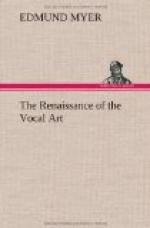This is the age of physical culture in all its forms. There is a tendency from the artificial habits of life, back, or rather one should say forward, to Nature and Nature’s laws. “Athletes appreciate the value of physical training: brain-workers appreciate the value of mental training, of thinking before acting, and if you would become either you must follow the methods of both.”
Many of our foremost educators in all branches of development, physical, mental and musical, are now making a bold stand for natural methods of education. However, all vocal training and development in the past, we are glad to say, has not been on the wrong side of the question.
There have been, at all ages and under all circumstances and conditions, men who have been at the root or the bottom of things,—men who have preserved the truth in spite of their surroundings. So in the vocal art, there have been at every decade a few men who have known the truth, and who have handed it down through the dark ages of the vocal art. The work of these men has not been lost. Its influence has been felt, and is today more powerful than ever. Hence the trend of the best thought of the profession is away from the ideas of the local-effort school, away from rigidity and artificiality, and more in the direction of naturalness and common sense. I believe we are now, as a profession, slowly but surely awakening to truths which will grow, and which will in time bring to pass that which must come sooner or later, the new school of the twentieth century.
There is to-day that which is known as “The New Movement in the Vocal Art”—a movement based upon natural laws and common sense and opposed to the ideas of the local-effort school;—movement in the direction of freedom of action, spontaneity and flexible strength as opposed to rigidity and direct effort;—a movement which advocates vitalized energy instead of muscular effort;—a movement which had its origin in the belief that no man ever learned to sing because he locally fixed or puckered his lips; because he held down his tongue with a spatulum or a spoon; because he locally lowered or raised his soft palate; because he consciously moved or locally fixed his larynx; because he consciously, rigidly set or firmly pulled in one direction or another, his breathing muscles; because he carried an unnaturally high chest at the sacrifice of form, position and strength in every other way; because he sang with a stick or a pencil or a cork in his mouth; or because he did a hundred other unnatural things too foolish to mention. No man ever learned or ever will learn to sing because of these things. It is true he may have learned to sing in spite of them, which shows that Nature is kind; but as compared to the whole, he is one in a thousand.
“The New Movement” has come to stay. It will, of course, meet with bitter opposition. Why not? The custom of many has been, and is, to condemn without investigation; to condemn because it does not happen to be in the line of their teaching and study. Someone has said, “He who condemns without knowledge or investigation is dishonest.”




